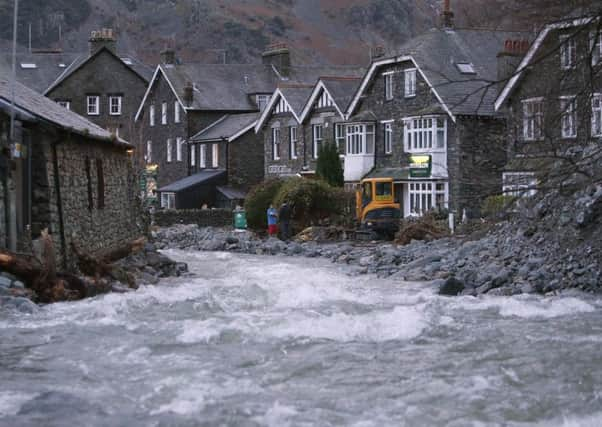YP letters: How coal’s future was destroyed


IT is indeed sad to see the closure of Kellingley Colliery, following so soon after the closure of Hatfield Colliery. The reasons for closure originated in the year long strike in 1984-85 when many major customers were obliged to switch to oil and/ or gas to keep their businesses afloat as coal was not available.
The market for coal was thus greatly reduced by the end of the strike. At that time, there still remained a future for coal if the cost of production could be reduced to a more manageable level.
Advertisement
Hide AdAdvertisement
Hide AdThe attack on fossil fuels, particularly coal, as a source of energy because of high carbon emissions made its ultimate demise inevitable particularly when the carbon levy was introduced by Ed Miliband and increased by the coalition Government to a level roughly four times of that anywhere else in Europe, making UK coal far too expensive against cheap imports.
Ed Miliband, presumably backed all the way by Yvette Cooper and Ed Balls, championed wind energy and we soon saw the final insult to coal, with turbines littering former coalfield areas and green belt sites.
This despite the important development of a carbon capture scheme, based around Hatfield Colliery which would have used local coal supplies and generated a very significant amount of low-carbon energy to supply thousands of homes and industries and probably attracted other heavy- polluting industries to the area, with many skilled jobs available.
The EU regarded this scheme as the best, most advanced in Europe and offered a grant of €400m for its development if matched by the UK government. Further significant investments were on offer from the Far East and China was reportedly interested in learning from the capture scheme for obvious reasons.
Advertisement
Hide AdAdvertisement
Hide AdIf Hatfield, Kellingley and coal mining anywhere in the UK was to survive then carbon capture had to be adopted and pursued vigorously.
In the course of the last few years we have seen subsidies handed to wind farm developers for supplying a very low percentage of the UK’s energy requirements, on an unreliable basis. If these subsidies had been made available on a controlled basis to CCS and the remaining collieries, the very significant indigenous coal available could have been used sensibly to the benefit and advantage of UK industries and householders as energy prices could have been lowered with the lower carbon levies. The great power stations of Drax, Ferrybridge and Eggborough would have been able to regularly produce 20 per cent of the country’s energy requirements.
Why it’s vital to dredge
From: Paul Muller, Sandal, Wakefield.
THEY said that 14 inches of rain fell in Cumbria in 24 hours. This gives a very poor impression of the amount of rain that fell onto the hills. In fact many million tons of rain fell in a short time.
The rain runs off the hills and mountains into the valleys forming the lakes in the Lake District. Once the lakes are full they overflow into the rivers; the water should then eventually reach the sea. If there are blockages in the rivers, the massive downward flow of water will be halted; this will cause the flow to go laterally flooding the land, the streets, and the houses.
Advertisement
Hide AdAdvertisement
Hide AdFlowing water will take everything before it as was seen in Cumbria.
It is impossible to put up barriers to the flow of water (Tom Richmond, The Yorkshire Post, December 12). The solution is to allow the waters in rivers a free flow to the sea; by dredging the blockages out of the rivers so that there is no obstruction.
You stop the bath from overflowing by pulling out the plug if you cannot turn off the tap.
PM’s a man on the run
From: Terry Duncan, Greame Road, Bridlington.
HOW long must we tolerate David Cameron – Dodgy Dave – who disappears abroad when he UK faces answers to major issues. The latest was his welly-boot fleeting visit to Cumbria, followed by his failing PMQs appearance, along with his kick in the face from Poland on migrant benefits.
Advertisement
Hide AdAdvertisement
Hide AdThen he avoids answering the delay in his promised Christmas report on an extra runway at London, and puts it off until the summer of next year.
Maybe, he should suggest a landing strip in the airport at Land’s End for his private plane!
When can we get the Prime Minister stand up in Parliament and tell us the truth?
The man needs to get a grip.
Card sharp
From: Mr V Platt, Cold Bath Road, Harrogate.
I’VE just been into Clinton’s Cards (Harrogate) and bought six Christmas cards. The female assistant put them through her scanner and paused for a few seconds and she said: “What?”
Advertisement
Hide AdAdvertisement
Hide AdI said, “Aren’t you going to put them into a bag, you usually do?”
She replied: “I’ve only got two or three left.”
I thought, but didn’t say, what’s that got to do with the price of fish, or me. She reluctantly produced a bag and put the cards in. I picked them up and she said, “That’s 5p for the bag”.
I said: “No way! The law stipulates only plastic bags are chargeable, not paper ones.”
She wasn’t very happy but I warned the queue behind me: “Don’t pay for bags.”